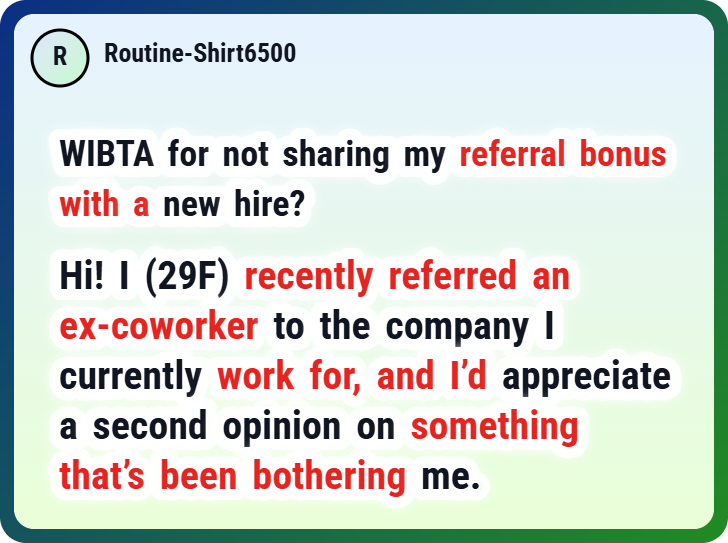WIBTA for Keeping My Referral Bonus? Why I’m Not Sharing It with the New Hire

So here’s the deal. A 29-year-old woman referred a former colleague, let’s call him Mike, to her current company. Mike gets hired, which is cool… but then things get weird.
Advertisement – Continue Reading Below
Out of nowhere, Mike starts asking about the employee referral bonus. He’s like, “Hey, aren’t you supposed to share that with me?” And apparently, someone in HR even told him she should use the bonus to take him out for dinner. Yeah, kinda awkward.
The twist? She didn’t even know a referral bonus existed until Mike brought it up. She hasn’t seen a dime of it yet. But now she’s stuck with Mike dropping hints and straight-up asking her to split it.
Advertisement – Continue Reading Below
The problem is—this is her money. Referral bonuses are a company incentive, not some shared paycheck. Plus, she’s got her own financial obligations, bills, student loans, cost of living stress—the usual real-world stuff. The idea of splitting the bonus with Mike feels off, especially when he’s the one pushing for it.
What makes it worse is HR casually talking about her compensation package with someone else. That’s a total workplace boundaries issue. Imagine finding out your coworkers are chatting about your paycheck. It’s unprofessional, and honestly, it borders on HR confidentiality violations.
So now she’s stuck wondering: does keeping the full referral bonus make her an “asshole”?
Advertisement – Continue Reading Below
Some people really know how to test the limits of entitlement, like by getting a favor and then demanding more

The author referred a former coworker to her current company, and he was hired for the role









Understanding Referral Bonuses and Workplace Etiquette
Referral bonuses sound simple, right? You recommend someone, they get hired, and the company thanks you with a little extra cash. But in real life, it can get messy—especially when money, coworkers, and HR get involved. Let’s break it down in plain words.
1. Who Actually Owns the Referral Bonus?
Referral bonuses are incentives companies give employees for bringing in good hires. It’s basically a way for businesses to save on recruitment costs. The money is a thank you to the referrer. Period.
It’s not meant to be split with the person who got hired. Their “bonus” is the job itself—steady paycheck, health insurance, benefits, career growth. Asking for a cut of your bonus is like asking someone to split their paycheck. As etiquette expert Emily Post said: “Money is personal. Nobody needs to know what you make or why you make it.”
Advertisement – Continue Reading Below
2. HR Policies and Confidentiality
Here’s where it gets sketchy. Human Resources should never be discussing your pay or bonuses with other employees. That’s a workplace confidentiality issue and can create drama real quick.
For an HR rep to suggest you “take Mike to dinner with your bonus”? That’s unprofessional. HR is supposed to be neutral, not fueling gossip or pressuring employees about how to spend their money. If this happens, it’s okay to push back—or even escalate to higher management.

3. Workplace Etiquette: Why Mike’s Request is Out of Line
Advertisement – Continue Reading Below
It’s just bad manners for a referred employee to ask for a share of the referral bonus. In professional settings, that’s considered entitled. Mike already won—he got the job. Expecting extra cash from the person who helped him get in is crossing into toxic coworker territory.
As one Reddit user perfectly put it: “Mike’s bonus is that he now has a job.”
4. Taxes, Money, and Real-Life Bills
Another thing—referral bonuses aren’t free money. They’re treated like regular income, which means payroll taxes get taken out. If you try to “split” the money, you could create tax headaches later.
Advertisement – Continue Reading Below
On top of that, most of us already have financial obligations—rent, student loans, credit card debt, car payments, maybe even home repairs. Nobody should be guilt-tripped into giving away money they legally earned just to keep a coworker happy.
5. Legal Framework and Company Policies
There’s no law that says you have to share your referral bonus. Most employment laws and company handbooks clearly state the reward goes to the employee who made the referral. It’s tied to your employee rights, not the new hire’s.
If Mike or HR tries to push the idea, ask for it in writing. Spoiler: they won’t, because it’s not company policy.
Advertisement – Continue Reading Below
6. How to Handle the Situation Without Burning Bridges
So what should she do? Keep the full referral bonus—it’s hers. And if Mike keeps asking, she can politely but firmly say: “The referral bonus is part of my compensation package. It’s not something that’s shared.”
If HR keeps crossing boundaries, she’s got every right to raise it with senior management or ask for help from an employee relations specialist. That way, she’s standing up for herself while keeping things professional.
Netizens supported the author and insisted that she wouldn’t be wrong for not sharing her bonus with the former coworker, especially since she also needed it






At the end of the day, she’s not the “asshole” for keeping her employee referral bonus. That money is recognition for her contribution to the company’s hiring process, not something she’s obligated to split. There’s no law, no HR policy, and no workplace etiquette rule that says you have to hand over part of your paycheck just because someone asks.
Advertisement – Continue Reading Below
What matters more here is setting healthy workplace boundaries. If she lets Mike pressure her once, he’ll keep pushing. And honestly, HR shouldn’t be hinting at what she should do with her bonus either—that crosses lines around confidentiality and employee rights.
Keeping the bonus isn’t selfish. It’s smart. She’s got her own bills, financial planning goals, maybe even student loans or home repairs. Mike already got his reward—the job.
The best move? Stay polite but firm. A simple, “The referral bonus is part of my compensation. It’s not something I share,” keeps it professional without starting more drama. Clear communication and boundaries are what keep toxic coworkers from overstepping and protect your peace at work.
Advertisement – Continue Reading Below
So no, she’s not wrong. She’s just protecting herself, her paycheck, and her professionalism. And that’s exactly what good career advice and solid HR policies would back up.






